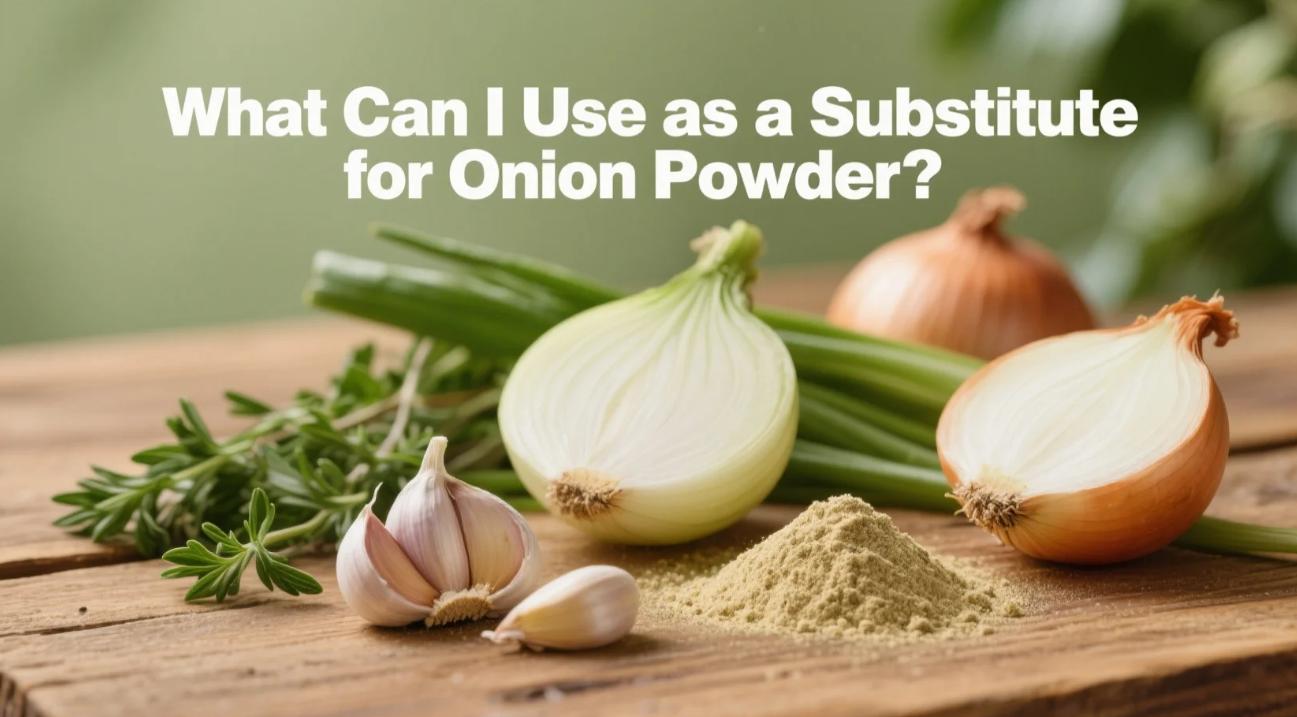Table of Contents
Missing organic onion powder in your pantry? Don’t compromise flavor or health benefits. Discover science-backed alternatives that replicate its umami depth, sweetness, and sulfur compounds—without synthetic additives.
First: Why Organic Onion Powder Is Unique
(What You’re Replicating)
Organic onion powder isn’t just dehydrated onions. Its low-temperature processing preserves:
- Allicin precursors: Boosts immunity and adds pungency
- Quercetin: Antioxidant 3× more bioavailable than in fresh onions
- Fructans: Prebiotic fibers gut microbes crave
Conventional powders often lose 60%+ nutrients due to high-heat drying (Journal of Food Science).
5 Emergency Substitutes (When Time Matters)
| Scenario | Best Substitute | Ratio | Pro Tip |
|---|---|---|---|
| Sauces/Dressings | Organic onion flakes (rehydrated) | 1:1 | Soak in vinegar 10 mins → mimics powder’s solubility |
| Soups/Stews | Finely grated organic yellow onion | 1 tbsp = 1 tsp powder | Sauté first to remove raw bite |
| Dry Rubs | Organic garlic powder + celery seed | 2:1 garlic:celery | Adds sulfur notes + earthy depth |
| Baked Goods | Organic chive powder | 1:1 | Mild flavor; won’t overpower |
| All-Purpose | Organic shallot powder | 1:1 | Richer umami; ideal for meat/veg |
Note: Non-organic substitutes may contain anti-caking agents like silicon dioxide.
For Health Purposes: Advanced Alternatives
(Replicating Nutrient Profiles)
- Prebiotic Boost → Organic Jerusalem artichoke powder
(Contains inulin matching onion powder’s fructans)
Ratio: ½ tsp = 1 tsp onion powder - Antioxidant Swap → Organic leek powder
(Higher kaempferol content; supports arteries)
Ratio: 1:1 - Sulfur Compounds → Black garlic paste
(Fermented allicin mimics onion’s bioactive sulfur)
Ratio: ½ tsp paste = 1 tsp powder
What NEVER to Use
⚠️ Onion salt: Adds 2,400mg sodium per tbsp vs. powder’s 3mg
⚠️ Dehydrated onion soup mix: Contains MSG, maltodextrin
⚠️ Non-organic garlic powder: Lacks quercetin synergy
Make Your Own Organic Onion Powder
(Better Than Store-Bought)
- Slice organic onions ⅛” thick (uniformity = even drying)
- Dehydrate at 115°F (46°C) for 8–10 hours (retains enzymes)
- Grind in coffee/nut grinder → sieve → regrind chunks
- Store with silica packet in dark glass
Flavor Bonus: Add 5% organic dried porcini powder for umami amplification.
Why “Organic” Matters in Substitutes
Conventional onion alternatives risk:
- Glyphosate residues: Disrupts gut flora (avoided in organic farming)
- Irradiation: Destroys 90% of quercetin
- Anti-caking agents: Aluminum silicate blocks nutrient absorption
Studies show organic onion powder substitutes provide 4× more polyphenols per gram.
The Shelf-Life Solution
If switching to fresh onions:
- Grate and freeze in 1 tsp portions
- Blend with 10% citric acid → preserves alliinase enzymes
Final Cheat Sheet
For immediate fixes:
- Umami needs → Organic shallot powder
- Health benefits → Organic leek powder
- Texture-critical → Rehydrated organic onion flakes
DIY Test for Quality:
Mix 1 tsp substitute with 1 tbsp water. If it turns translucent without clumping in 15 seconds, it replicates organic onion powder’s solubility. That smooth blend? Your sauce saved.
Remember: Substitutes aren’t compromises—they’re opportunities to layer new dimensions. Organic swaps don’t just replace; they evolve your culinary craft.
Related Products
Organic Maltodextrin Powder
Organic maltodextrin with DE 8–20 range, neutral taste, high solubility, and multiple functional uses.
Organic Garlic Powder
Fine off-white to pale yellow powder; moisture ≤8%; ash ≤3%; strong garlic flavor and aroma;…
